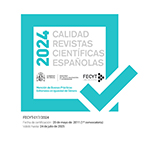De la “industria del piquete” al “paraíso verde”. Turismo y pueblos originarios en un municipio del norte argentino
Resumen
El turismo ha adquirido importancia en las políticas públicas latinoamericanas orientadas a indígenas en las últimas décadas: es propuesto como herramienta para el desarrollo de estos pueblos, en articulación con los discursos vinculados al multiculturalismo. Recuperando los aportes de los estudios antropológicos sobre el Estado y las políticas públicas, este trabajo apunta a reflexionar sobre cómo el fomento al turismo es experimentado y recreado en su circulación por los espacios estatales. Se basa en una investigación de metodología cualitativa desarrollada en un municipio de la región conocida como Chaco Salteño, centrada en la observación participante, la realización de entrevistas, recopilación de fuentes, etc. Abordo el plan de turismo propulsado por la secretaría provincial, enfatizando en las referencias a los modos de visibilización de los pueblos originarios y el lugar de los municipios en su implementación. Luego considero las apropiaciones locales a través de diversas prácticas y discursos de la administración municipal.
Descargas
Descarga artículo
Licencia
La Revista de Antropología Social, para fomentar el intercambio global del conocimiento, facilita el acceso sin restricciones a sus contenidos desde el momento de su publicación en la presente edición electrónica, y por eso es una revista de acceso abierto. Los originales publicados en esta revista son propiedad de la Universidad Complutense de Madrid y es obligatorio citar su procedencia en cualquier reproducción total o parcial. Todos los contenidos se distribuyen bajo una licencia de uso y distribución Creative Commons Reconocimiento 4.0 (CC BY 4.0). Esta circunstancia ha de hacerse constar expresamente de esta forma cuando sea necesario. Puede consultar la versión informativa y el texto legal de la licencia.












